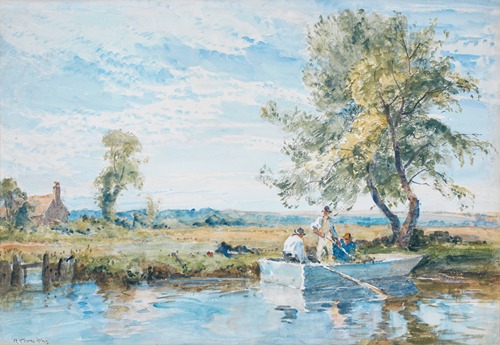
Robert Thorne Waite
Robert Thorne Waite was a painter, mostly in watercolour, of bright and airy landscapes and pastoral scenes. He was particularly fond of the corn and hay fields of the South Downs.
Robert Thorne Waite was born in Cheltenham on 18 April 1842, the seventh of eight children of the watchmaker, Thomas Waite, and his wife, Elizabeth (née Amphlett). He was educated at Cheltenham Grammar School, and then, from 1860, he studied art at the National Art Training School, South Kensington, London. During the mid 1860s, he worked at Bettws-y-Coed, North Wales, alongside his close contemporary, Thomas Collier, developing a style that emulated the work of David Cox and Copley Fielding.
Thorne Waite exhibited mainly at the Royal Society of Painters in Water-Colours, being elected an associate in 1876 and a full member in 1884. He showed at a range of venues, including the Royal Academy of Arts and a number of dealers, and was also elected to the Royal British Colonial Society of Artists and the Royal Institute of Oil Painters,
the latter in 1883. In that year, he was living with his wife, Marian (née Parkman), and two daughters at 35 Dartmouth Park Road, Kentish Town. About a decade later, in 1891, they moved a couple of miles west to Maitland Park Villas, Maitland Park Road. By that date, they also had a son.
By the outbreak of the First World War, Thorne Waite had moved to Bournemouth and was living at Greta, 12 Queen’s Park, West Drive. He died in Bournemouth on 28 February 1935.
